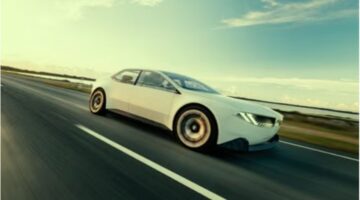It’s a concept that’s been around for over 100 years, but it’s only recently that the idea of an electric car has really taken off. With a greater focus on protecting our environment, as well as the day to day cost benefits of an electric powertrain, the electric car is making waves in the motoring industry, with more companies focusing their energy into developing desirable electric vehicles.
Following on from Volkswagen’s record-breaking run at the Goodwood Festival of Speed in July, Lookers Volkswagen, stockists of the Volkswagen Up! and the e-Up!, we take a look at how electric cars have evolved through time and how they compare to their petrol and diesel compatriots as more members of the public make the change.
The history of electric cars
The first electric vehicle hit the roads way back in the 1800s when innovators from the Netherlands, Hungary and the United States toyed with the idea of a battery-powered vehicle. They created small-scale electric cars, but it took until the second half of the 19th century before French and English inventors produced the first practical electric vehicles.
Electric cars quickly became popular with the public thanks to their relevant simplicity to drive and their quiet nature; they were perfect for short trips in the city. Thomas Edison worked to develop better batteries for electric vehicles and in 1901, the world’s first hybrid electric car was invented.
When crude oil became cheaper in 1920, there was a decline in electric vehicles, but fast forward to the 1990s and environmental regulations brought renewed interest to the models. With a green future becominga main objective amongst the world’s leaders, it’s anticipated that by 2040 electric cars will account for a third of global sales. In the UK, ministers have been informed that most new cars would need to be electric by 2030 and, with fully autonomous cars due to be rolled out in the coming years, the industry is wellon its way to hitting this target, especially as motoring giants are producing more and more electric versions of their fleet.
How have electric cars improved?
It’s said that electric vehicles are already changing the world — and this is only the beginning. The world is realising that we have to move away from a fossil fuel-driven economy towards one that is more sustainable as we attempt to bring a halt to climate change. Transportation can, and is, one area that must be focused on. In 2017, more than half of cars sold in Norway were electric, while China continues to lead the way in a market that keeps growing. In fact, with sales of electric cars rising each month, Volkswagen has announced a $10 billion investment in the country to develop relevant technology and has set out plans to manufacture 1.5 million electric vehicles by 2025.
Lithium-sulphur and solid state devices are also in development to continue the improvement in the car’s battery life. Also, the number of charging points available in the UK is on the rise, quickly increasingby over 5,000 between 2016 and 2017.It’s these two developments that are leading the way in the electric car revolution.
And it’s not just the public’s vehicles that are witnessing such improvements. Spectators at the 2018 Goodwood Festival of Speed were treated to a record-breaking run as the VW ID R, fresh from breaking the record for the fastest run up the Pikes Peak international Hill Climb,smashed the officialhillclimb record for electric vehicles by 3.5 seconds. This, on top of the rise of the enthralling Formula E series, shows just how far these automobiles are coming.
How do they compare to petrol and diesel cars?
While electric cars are still seen to be more expensive than their petrol and diesel counterparts, that price is steadily falling. Thanks to rules that are being introduced to limit the kind of vehicles allowed into major cities, electric cars are becoming more mainstream.
Electric cars, since they have very few moving parts, in theory allow for fewer issues to arise. This means that on the whole, servicing your electric car should be cheaper than a petrol or diesel car. However, the range you achieve from an electric car, although increasing as batteries improve, isn’t as good as what you’d receive from a full tank of petrol or diesel.
Currently, aside from the environmental benefits, the type of driving you do is key to whether you choose petrol or electric for your next car. However, given timeand with constant technological advancements you can expect the power and range of electric cars to improve, meaning the rise of the electric vehicle in the 21st century is one that looks like gaining even greater moment over the coming years.









